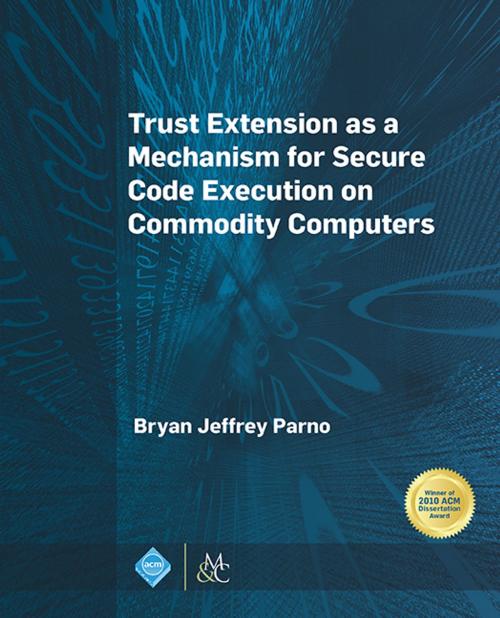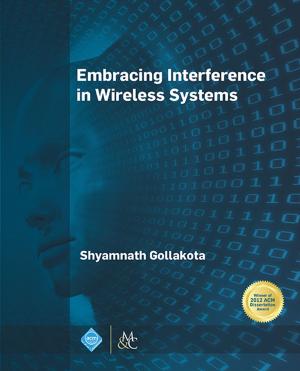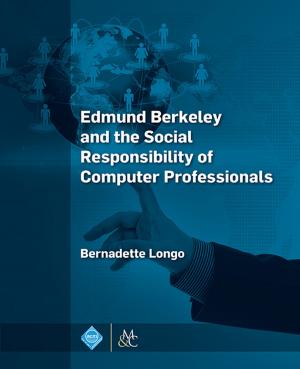Trust Extension as a Mechanism for Secure Code Execution on Commodity Computers
Nonfiction, Computers, Advanced Computing, Computer Science, Internet, Security, Application Software, Computer Security| Author: | Bryan Jeffrey Parno | ISBN: | 9781627054799 |
| Publisher: | Association for Computing Machinery and Morgan & Claypool Publishers | Publication: | June 1, 2014 |
| Imprint: | ACM Books | Language: | English |
| Author: | Bryan Jeffrey Parno |
| ISBN: | 9781627054799 |
| Publisher: | Association for Computing Machinery and Morgan & Claypool Publishers |
| Publication: | June 1, 2014 |
| Imprint: | ACM Books |
| Language: | English |
As society rushes to digitize sensitive information and services, it is imperative to adopt adequate security protections. However, such protections fundamentally conflict with the benefits we expect from commodity computers. In other words, consumers and businesses value commodity computers because they provide good performance and an abundance of features at relatively low costs. Meanwhile, attempts to build secure systems from the ground up typically abandon such goals, and hence are seldom adopted. In this book, I argue that we can resolve the tension between security and features by leveraging the trust a user has in one device to enable her to securely use another commodity device or service, without sacrificing the performance and features expected of commodity systems. At a high level, we support this premise by developing techniques to allow a user to employ a small, trusted, portable device to securely learn what code is executing on her local computer. Rather than entrusting her data to the mountain of buggy code likely running on her computer, we construct an on-demand secure execution environment which can perform security-sensitive tasks and handle private data in complete isolation from all other software (and most hardware) on the system. Meanwhile, non-security-sensitive software retains the same abundance of features and performance it enjoys today. Having established an environment for secure code execution on an individual computer, we then show how to extend trust in this environment to network elements in a secure and efficient manner. This allows us to reexamine the design of network protocols and defenses, since we can now execute code on endhosts and trust the results within the network. Lastly, we extend the user's trust one more step to encompass computations performed on a remote host (e.g., in the cloud). We design, analyze, and prove secure a protocol that allows a user to outsource arbitrary computations to commodity computers run by an untrusted remote party (or parties) who may subject the computers to both software and hardware attacks. Our protocol guarantees that the user can both verify that the results returned are indeed the correct results of the specified computations on the inputs provided, and protect the secrecy of both the inputs and outputs of the computations. These guarantees are provided in a non-interactive, asymptotically optimal (with respect to CPU and bandwidth) manner. Thus, extending a user's trust, via software, hardware, and cryptographic techniques, allows us to provide strong security protections for both local and remote computations on sensitive data, while still preserving the performance and features of commodity computers.
As society rushes to digitize sensitive information and services, it is imperative to adopt adequate security protections. However, such protections fundamentally conflict with the benefits we expect from commodity computers. In other words, consumers and businesses value commodity computers because they provide good performance and an abundance of features at relatively low costs. Meanwhile, attempts to build secure systems from the ground up typically abandon such goals, and hence are seldom adopted. In this book, I argue that we can resolve the tension between security and features by leveraging the trust a user has in one device to enable her to securely use another commodity device or service, without sacrificing the performance and features expected of commodity systems. At a high level, we support this premise by developing techniques to allow a user to employ a small, trusted, portable device to securely learn what code is executing on her local computer. Rather than entrusting her data to the mountain of buggy code likely running on her computer, we construct an on-demand secure execution environment which can perform security-sensitive tasks and handle private data in complete isolation from all other software (and most hardware) on the system. Meanwhile, non-security-sensitive software retains the same abundance of features and performance it enjoys today. Having established an environment for secure code execution on an individual computer, we then show how to extend trust in this environment to network elements in a secure and efficient manner. This allows us to reexamine the design of network protocols and defenses, since we can now execute code on endhosts and trust the results within the network. Lastly, we extend the user's trust one more step to encompass computations performed on a remote host (e.g., in the cloud). We design, analyze, and prove secure a protocol that allows a user to outsource arbitrary computations to commodity computers run by an untrusted remote party (or parties) who may subject the computers to both software and hardware attacks. Our protocol guarantees that the user can both verify that the results returned are indeed the correct results of the specified computations on the inputs provided, and protect the secrecy of both the inputs and outputs of the computations. These guarantees are provided in a non-interactive, asymptotically optimal (with respect to CPU and bandwidth) manner. Thus, extending a user's trust, via software, hardware, and cryptographic techniques, allows us to provide strong security protections for both local and remote computations on sensitive data, while still preserving the performance and features of commodity computers.















